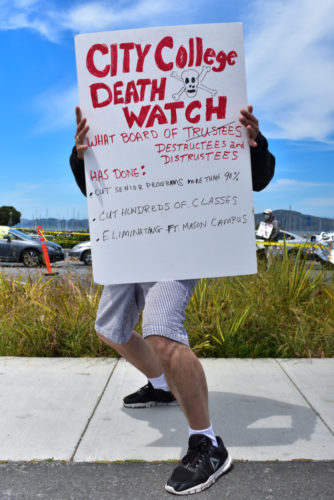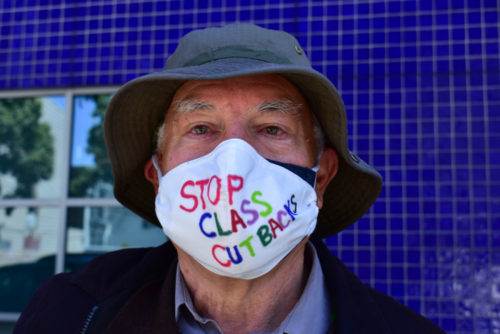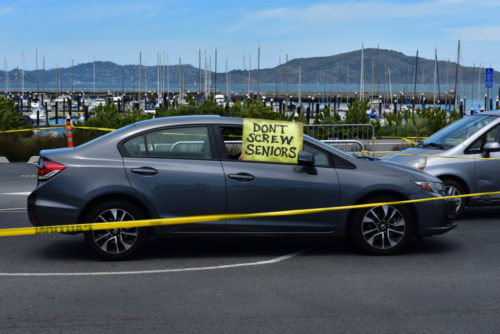The Survival of City College’s Fort Mason and Civic Center Looks Grim
By Tim Hill and Jennifer Yin
Uilleanner@gmail.com
Jyin4@mail.ccsf.edu
Contributor and Staff Writer
City College’s Older Adult Learning (OLAD) and English as a Second Language (ESL) programs are in grave danger, and not just because of coronavirus. City College’s administration has decided to cut courses from the two departments for the fall semester.

There has also been discussion within the administration and the Board of Trustees regarding forgoing the lease of the Fort Mason campus where older adult learners practice their art. The Civic Center campus is located at, 1170 Market St., and is slated to suffer a similar fate, as ESL classes are located there. Many students and faculty are now left wondering what to do next.
ESL Students and Faculty
Until recently, the college committed to keeping both campuses. Since the lease for the Civic Center location is set to expire at the end of this year, the ESL department fate is hanging by a thread.
Citing concerns about the satellite location’s students many of whom are older, low income, and unable to read or write in English has forced the college to face a difficult decision between fiduciary responsibility and serving the entire city of San Francisco at large.
Many students feel that ESL is the only program that they can successfully learn English in, yet the current location remains somewhat of a barrier for some folx.
ESL faculty, Audrey Wallace, mentioned on a May 15, Higher Education Action Team (HEAT) caravan protest how the elimination of programs also equates to the elimination of valuable health insurance. Wallace’s family is in danger of not having a provided health care insurance plan in the midst of the coronavirus pandemic leaving her two daughters and husband vulnerable.
“There was no notice and we were scattered to the forewinds. We were relocated for a semester and then moved to a temporary location on Market St., the permanent location is actually on 750 Eddie St., which was supposed to be renovated in the last six years, and has not been. It is lying empty although we own it. We do not know we do not have any real information on what is going to happen with that building. We heard we are going to close our campus and be relocated, again,’ Wallace said.
The department used to be housed in the heart of the Tenderloin, where many of its students live, at 750 Eddy St. Having to walk to Market St., is a source of apprehension for some students, largely due to the extra time it takes for some students to travel. Some are essential workers, whose bus or walking commute is compromised due to San Francisco Municipal Railway (MUNI) reroutes and construction. The extra 15 minutes of commute both ways adds up. “The combination of remote learning and non-credit classes hit students hard,” said ESL instructor Diep Le.

With Civic Center looking to reduce the size of its campus, many ESL students are feeling afraid and displaced, notwithstanding the current global fears of the coronavirus. The campus also held many evening classes, which proved to be a blessing for some and a hindrance for others.
Fort Mason Center and OLAD
City College students gathered at the Fort Mason Center for HEAT’s caravan to vocalize their concerns regarding future class cuts. A total of 24 cars were present with signs adorned to its windows proclaiming, “Save Life Long Learners,” and, “Bring Back Older Students! Don’t Isolate, Integrate! We Belong at Fort Mason!”
Around 2 p.m., HEAT member Stephen Bradley took to the center and said, “They say this is about money and I do not believe that. The lease is only about $400K a year. $400K is about what they pay Rocha to leave, that (could) pay Fort Mason for the next year.”
In a Board of Trustees board and budget audit committee meeting held on May 14, Senior Vice Chancellor Tom Bogel, mentioned how Fort Mason had credited art classes in many disciplines including painting, drawing, sculpture, ceramics, and printmaking. “We have historically had some a small number of non credited older adult classes, figure drawing and painting. We had historically three classes each fall and spring and those were removed effective spring of 2020. Given our current budget situation it is unlikely we will be able to restore it anytime in the near future.”
Disparities

“Students are feeling like there is nowhere else left to go,” Le said, “ We’ve been taking photos of textbook pages and emailing them to students. Many are showing a determination to learn no matter
What.” While, OLAD students are relying on their classes as what Lorry Luikart, an older adult learner said, “We rely on it (the classes) for socialization and it is a way for us to express ourselves.”
Students and faculty want the BOT to move the ‘satellite campus’ back to its original location on Eddy St. ESL classes were formerly held at the administrative location on Gough St., then moved to the Mission Center, then to Chinatown, and now Civic Center. With a lease expiring there in Feb., of next year, the campus doesn’t have much time left to act.
